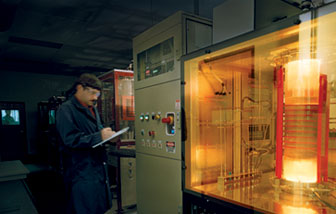
A technician at the Electro-Optics Center, in Armstrong County, monitors a furnace used to grow crystals that enable smaller, faster and more efficient electronics and communications.

John Heinz’s Legacy
Working to keep America at the forefront of the global marketplace
Real help for Pennsylvania’s industries
Technology and competitiveness
Keeping our workforce on the cutting edge
Real help for Pennsylvania’s industries
Through and through, John Heinz was a Pennsylvanian. Because of this, he keenly felt and understood the turmoil his state was enduring as a result of unfair trade practices. By the mid-1980s, the American steel industry was in serious decline and Heinz’s state, formerly the forge of the nation, was in trouble. Because of his desire to aid both his state and the steel industry as a whole, Heinz looked to create ways to make all of America’s industries globally competitive.
He worked within what was already on the books by sponsoring legislation that would become law, and to authorize continued appropriations to carry out the Export Administration Act of 1979. This was a further liberalization of export controls that had been in place in 1949 to prevent the export of scarce goods that would have a deleterious impact on U.S. industry and national economic performance.
In addition to supporting existing regulations, Heinz sought to put real teeth into new measures to fight unfair trade practices. To address the issue of steel “dumping” (foreign countries exporting steel to the United States at prices below the cost of production) and other unfair practices, Heinz began introducing legislation that encouraged exports by forming export trading companies and export trade associations, and expanding export trade services. A landmark law of his construction, the Export Trading Company Act of 1982, remains in effect, and the Office of Export Trading Company Affairs, within the U.S. Department of Commerce's International Trade Administration, is the governmental agency responsible for assisting Americans with export issues. You can find out more about their mission and services at their website.
Shortly before his death, Heinz requested a study by the Office of Technology Assessment to determine how the economic environment in the United States could be made more conducive to improving manufacturing performance.
Technology and competitiveness
Heinz also recognized that attempting to fix the steel problem wasn’t going to be enough to keep America from losing ground in the future. The country had to maintain a competitive edge in all of its industries. To achieve this end, Heinz worked with members of the House and Senate to pass the Stevenson Wydler Technology Innovation Act of 1980, which established an Office of Industrial Technologies to enhance technological innovation for the improvement of the economic, environmental and social well-being of the United States.
Additionally, Heinz teamed with Sen. Howard Metzenbaum to pass the Steel and Aluminum Energy Conservation and Technology Competitiveness Act of 1988. This law established an industrial energy conservation and competitive technology program to conduct scientific research and development to enhance the energy efficiency and competitiveness of American steel, aluminum, copper and other metals industries through public-private sector partnerships.
Keeping our workforce on the cutting edge
Heinz knew that not just industries were suffering—their employees were as well. Being so close to the problem of dislocated workers in Pennsylvania led Heinz to co-sponsor legislation in 1982 that would become known as the Job Training Partnership Act (JTPA). Its purpose was, and continues to be, the establishment of programs to prepare youth and unskilled adults for entry into the labor force and to afford job training to those economically disadvantaged individuals facing serious barriers to employment, who are in special need of such training to obtain productive employment. Further, JTPA offers an experience in training, retraining and upgrading job skills levels, job placements, and referrals services, job development and work experience. Such programs were critical to steelworkers in Pennsylvania as the domestic steel industry began to collapse.
John Heinz’s devotion to these issues and his search for proper solutions was noted by his colleague, Rep. William Coyne of Pittsburgh, who said, “When the U.S. trade deficit soared and thousands of American workers saw their plants and steel mills close, John Heinz spoke out with the demand that the United States must have both fair trade and free trade. He fought to ensure that U.S. trade laws were aggressively enforced against those who seemed willing to sacrifice U.S. jobs to what they considered the more important demands of U.S. foreign relations. John Heinz might have been criticized by some for his tireless efforts to promote fair trade, but he never forgot working families for whom a weak U.S. trade policy meant lost jobs and shattered dreams.”
